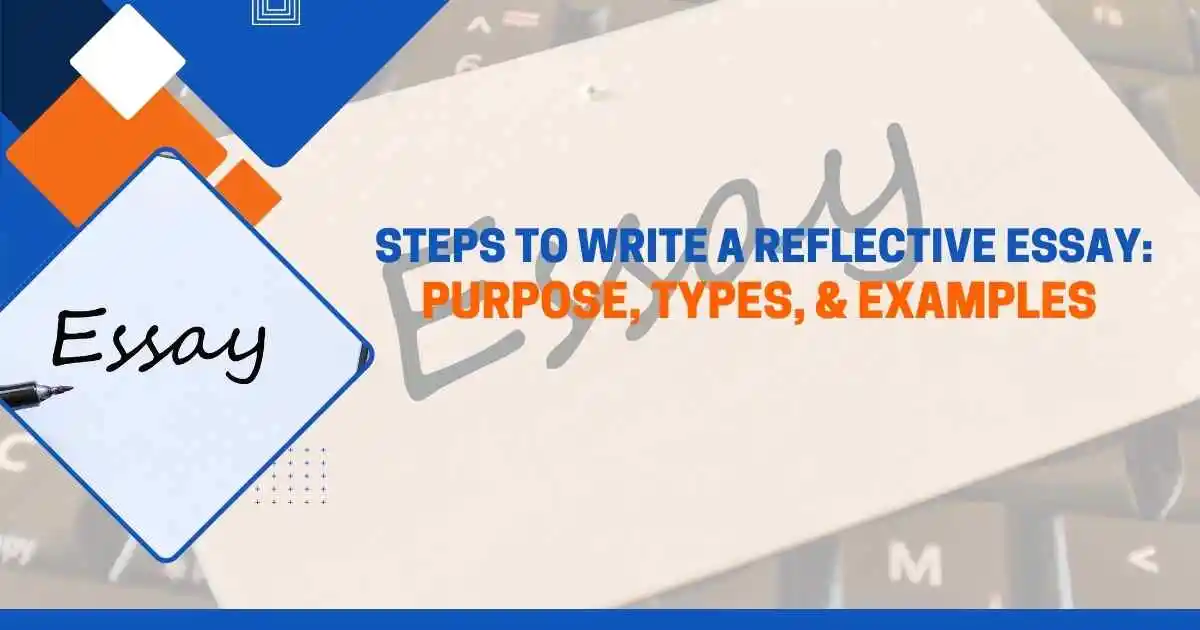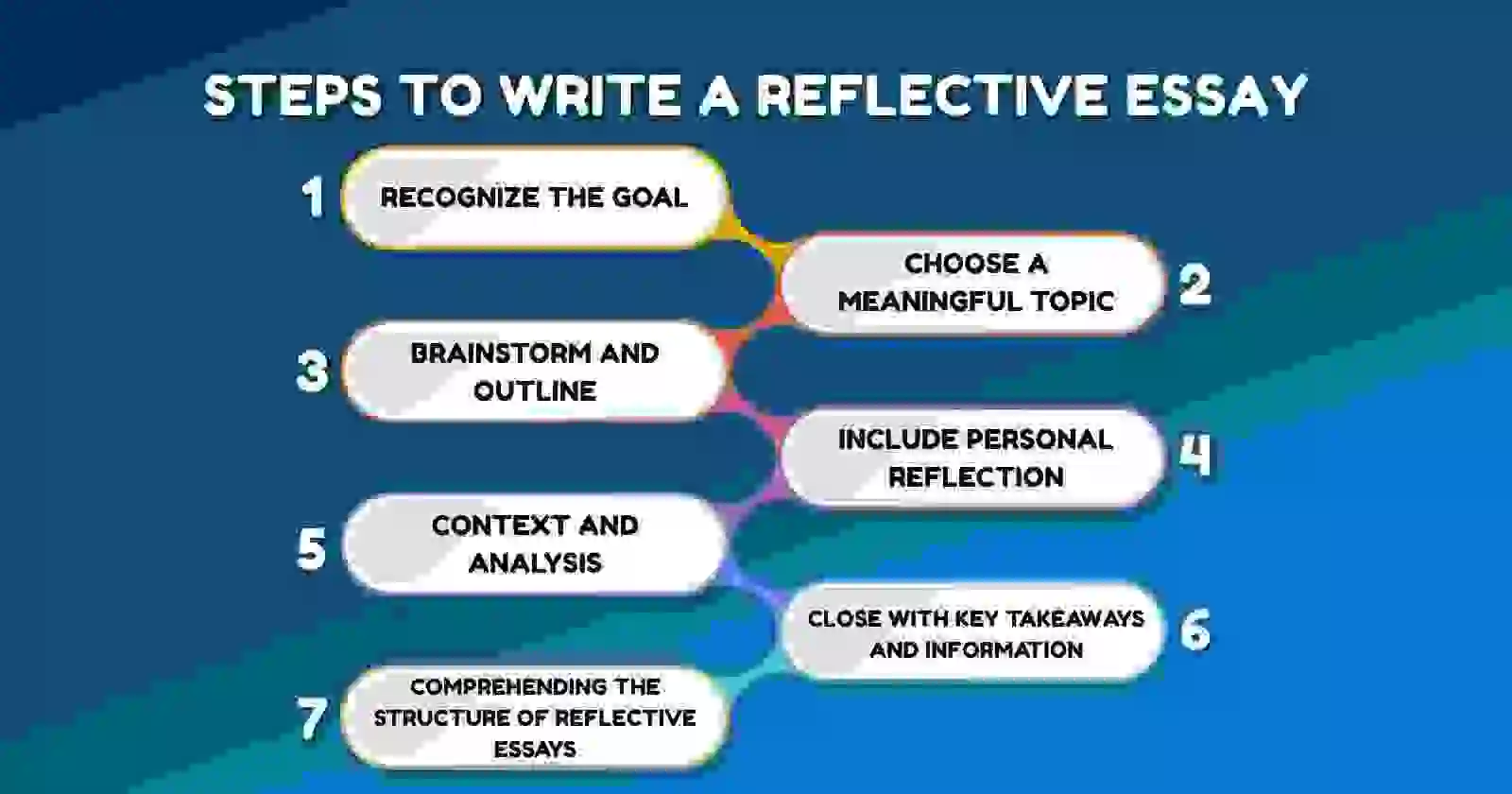How to Write an Analytical Essay | Steps & Guide
Let me guess, you've been assigned to write an analytical essay and you don't have any idea how to write one. But now th ...

Writing reflective essay is crucial to students' academic and personal development. They offer a forum for discussing ideas, emotions, and experiences while weighing their importance. However beginning a reflective essay can be intimidating, particularly for people who are not familiar with the form. Personal Growth Do not be alarmed! This article will go over some useful tactics to get you started on writing reflective essays.
The significance of contemplative reflection of the essay writing lies not only in enhancing self-consciousness but also in enhancing one’s critical skills. It is an essay that is required to show a reflective essay topic and in this, every writer examines a topic through their viewpoint. Sometime students write Reflection of Research Project using Gibbs Reflective Cycle.
In this blog, we Provide you with information about how to start a reflective writing It is also Similar to other essays in that it needs to be easily understood. In this essay writer examines his/her Topic.
For Writing a Reflective Essay We have to do a lot of practice and research on the essay topic. The topic can depend on original circumstances, like a purposeful life conversion, to more common themes such as self-development. This critical adds implications and depth to the essay. Finally, engaging with a reflective essay-writing service can lead to extensive learning and enhanced writing skills. Here are some useful tips for how to start a reflective essay.
Combine inspirational and dramatic language to make a strong optical in the reader’s sense. Many scholars think about, what to do during the class when bored. This not only boosts emotional absorption but also builds up your ideas to be more engaging, permissive the readers to connect with your experiences on a deeper stage.
Back up your ideas with specific and original-life incidents that establish your points. These examples give reliability to your assertions and help the readers to conceive your journey and produce the essay to be more accurate and engaging while improving your narrative.
Manage your essay Structure reasonably with translucent conversions between the reflections. A well-structured essay enhances the legibility and convention letting readers follow your reflective journey easily. The clear statement also shows your analytical skills that are significant for attaining the top scores.
Below we provide all the best ways to start a reflective essay for students. Writing a Reflective Essay may seem simple, but when we started, it was not so easy. In this guide, we tell, how to write the best reflective essay.

It is important to know why you are writing a reflective essay when you start. Reflective essays, in contrast to other types of academic writing, concentrate on the author's experiences, observations, and insights.
Whether it's a personal experience, a professional interaction, or an activity from the classroom, they push students to reflect, assess, and learn from their experiences. Reflective Writing Many essay helpers will be required of you during your academic career. Although you could or might not be able to select the essay topic of your choosing.
An effective reflection Online essay helper is mostly dependent on the topic that is chosen. Think back on events that have significantly influenced your academic or personal development.
Student Essays It can have been a difficult task, a moment that changed your life, an encounter with a different culture, or even a failure that gave you important insight. Selecting a subject that interests you both academically and emotionally will make composing more interesting and genuine Writing Tips.
After deciding on a subject, spend some time jotting down significant incidents, feelings, and realizations associated with that event. Note down your early feelings, recollections, and thoughts.
Next, arrange these concepts into a logical framework. Academic Reflection An introduction, body paragraphs addressing various facets of the event, and a conclusion analyzing the experience's relevance and lessons learned comprise the standard format of a reflective piece. This part Is very important to start a reflective essay.
A reflection essay's core is its incorporation of personal reflection. Don't be afraid to express your feelings, ideas, and responses to the event in your writing. When you analyze anything, be sincere and reflective.
Think back on the event, the lessons you took away, and the ways it aided in your academic or personal development. Critical thinking. To communicate the depth of your reflections, use colorful language and detailed descriptions.
Although reflective essays are personal, it's important to provide readers with a better understanding of the relevance of what you experienced by including perspective and Critically Discuss in an Essay. Describe the individuals involved, the situation's history, and any pertinent information.
Next, do a critical analysis of the experience, outlining its advantages, disadvantages, and consequences. Consider how it fits with your objectives, values, and beliefs. Reflect And GrowOne should also consider what you would do differently if you found yourself in a similar circumstance again.
Summarize the most important lessons you learned from the event in the last paragraph of your reflection essay. Consider how it has influenced your opinions, dispositions, and behavior.
Stress the value of lifelong learning and development, emphasizing the contribution the experience has made to your own progress. Give the reader something to think about or a call for action that will inspire them to consider their own experiences and observations.
The structure of a reflective essay often consists of an introduction, three body paragraphs, and a conclusion. There are several obvious distinctions between the framework of a reflective essay and an argumentative or research document, though. A reflective essay resembles a well-organized narrative with insightful analysis.
A reflection essay should normally be between 300 and write 1500 words long, although it's usually best to ask your instructor for clarification on the word count. Additionally, it is preferable to refrain from using too much information in your essay's wording.
An outline for a reflective essay looks like this. One can make a few adjustments to your reflective essay outline without significantly deviating from the main goal of the composition. Additionally, you should always follow the instructor's instructions on the format of the reflective essay. If you want any formatting assistance for your reflective essay, that you can refer to the formatting guides (APA, MLA, etc.) at your convenience.
If you are having trouble coming up with a reflective essay topic, you may contact the professionals at the Workingment company to receive the assistance you need. On the other hand, you may refer to the following
list of suggested top reflective essay examples subjects if you're struggling to come up with ideas for your essay;
Best Reflective Essay Writing Service is a Main Part of Learning through Experience. It helps Students to develop academic skills, understand a better topic, and highlight hidden abilities. The main point of a Reflective best essay writing service in Birmingham is to create individual development and self-contemplation.
By compelling the reflections, the writer can get detailed intuitions into self-development. A reflective essay is an Appropriate tool for both self and Curriculum development. Through this blog, we will learn about the vital part of reflective essay writing.
| Introduction |
Firstly We discuss how to write an Introduction for an essay. In the Start part, We write the first stage of the essay. In this, we Should provide a brief of the reflective writing essay structure. Write the background for the Topic and Write the focal point of the Reflective Essay. |
| Body |
The second one is the Body. This Essay Should be Organized into Several Paragraphs. In this We use Topic Sentences to Introduce the main Idea of Each Paragraph, also fulfill the detailed descriptions of your Essays. In the Body Part, Writers use to describe the Subject from their Point of View. |
| Conclusion
|
In Last Writers Write a Conclusion to an essay like Summarize and describe the opinion in the body paragraphs. Workingment Provides the reflective essay writing service in Birmingham. Writers Covers All the Topics in this blog like, How to begin a reflective essay and many more. This blog Discusses the full information of Reflective Essays. |
Here are some useful Information for how to Write a reflective Report that can help to achieve the top grades. In Structure of Reflective Report use section and sub-heading. Reflective Report We use Purpose for Writing this report. Write the Experience in a reflective Report and should include pertinent information.
Although it might be difficult to begin a reflective essay, doing so can be a fulfilling and life-changing experience if done correctly. Students may write powerful reflective essays by comprehending the assignment's goal, selecting a relevant topic, outlining and brainstorming, adding personal reflection, offering background information and analysis, and wrapping up conclusions and lessons learned Learning Journey.
If I want to write my essays, then I have to do a lot of practice and research on the essay topic. The topic can depend on original circumstances, like a purposeful life conversion, to more common themes such as self-development.
Students may create Write a Critical essay that highlights their development and learning journey by comprehending the aim, selecting a relevant topic, brainstorming and outlining, including their thoughts, offering context and evaluation, and finishing with insights and takeaways. Now take out your pen and paper and start writing your thoughts!
Workingment Company is dedicated to helping children succeed academically. For further tools and writing advice, check out our website!
Start the Introduction with some information and opinions on a specific topic. In the Introduction part, We overall focus on the Topic. Write some Key Elements to start the reflection essay.
An Essay usually retains three parts: an introduction, the main body, and a conclusion or final part.
There is no mandatory to add references in a reflection paper. If you want to add cite the sources to support your arguments, so you add references at the end of the essay.
Here are some vital elements of reflective essay writing such as : Selecting a topic , Constructing the essay , Integrating critical thinking and inspection
Yes, an Essay is the best option for mental development. This thing has been proven by many research studies. It examines the capability of the students to know the topic and compose about it.
Typically, the reflection eassy shold be around 250 to 800 words. The length of the reflection paper depends on your level of study.
Let's Book Your Work with Our Expert and Get High-Quality Content

Loved reading this Blog? Share your valuable thoughts in the comment section.
Add comment